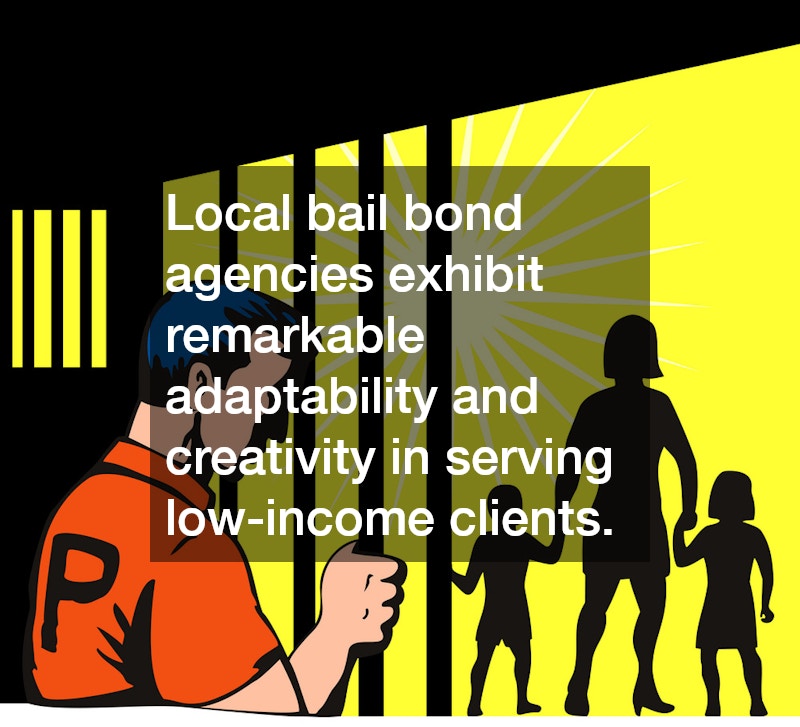The bail bond system plays a crucial role in the judicial process, yet it often poses unique challenges for low-income individuals. Many find themselves unable to afford the bail set by the courts, leading to extended pre-trial detention that can disrupt lives and livelihoods. This article delves into key challenges faced by low-income clients and explores specific strategies employed by local bail bonds agents to mitigate these challenges.
What Alternatives Exist for Low-Income Clients Unable to Afford Bail?
Sliding Scale Fees
Some bail bond agencies have adopted sliding scale fee structures, adjusting their charges based on the financial capacity of the client. This approach acknowledges the economic diversity of clients and seeks to ensure that bond services remain accessible irrespective of income levels.
By offering a flexible fee system, agencies can better serve low-income individuals who might otherwise remain detained due to financial constraints.
These agencies typically evaluate the client’s income, number of dependents, and other financial obligations to assess their ability to pay. The sliding scale fees can significantly reduce the initial financial burden on clients, assisting them in securing their release. Ultimately, this practice reflects a commitment to fairness and accessibility within the bail bond system.
Community-Based Support Programs
Community-based support programs collaborate with bail bond agents to assist low-income clients through financial and emotional backing. These programs often involve local non-profits, churches, and civic groups, creating a network of support around individuals in pre-trial detention. Such collaboration can offer temporary housing, transportation, and counseling services, easing the process of reintegration post-release.
Engagement with these programs enables clients to access resources that extend beyond financial assistance, emphasizing holistic support. Besides financial aid, clients benefit from the emotional and mental support provided through community networks, which are often crucial during stressful legal proceedings. Community-based initiatives thereby help clients focus on their legal defense and personal responsibilities, without the added pressure of isolation and resource scarcity.
Government and Non-Profit Initiatives
Governmental and non-profit initiatives play a pivotal role in lowering financial barriers in the bail system for low-income individuals. Programs such as bail funds, established by non-profit organizations, directly finance the bail for those unable to afford it. By providing these financial resources, such initiatives actively work to prevent unnecessary pre-trial incarceration based solely on economic status.
Governmental assistance often includes policy reforms aimed at setting bail amounts proportional to the offense and financial standing of the defendant. Legislative efforts focus on implementing fairer bail practices and minimizing disparities in pre-trial detainment. Such initiatives work in tandem with non-profit organizations to advocate for systemic change and support individuals negatively impacted by rigid bail practices.
How Do Bail Bond Agents Assess the Financial Needs of Clients?
Client Financial Assessments
Bail bond agents conduct thorough financial assessments to accurately gauge a client’s financial standing. These assessments typically involve evaluating income, debts, monthly expenses, and any existing financial commitments. By understanding these parameters, agents can tailor their services to fit the client’s economic situation, making bail more attainable.
Income verification is a standard procedure, ensuring that reported earnings align with the client’s actual financial capabilities. Agents may also consider any public assistance the client receives, providing a comprehensive view of their financial landscape. This meticulous approach enables bail bond agents to offer packages that do not overburden low-income clients financially.
Payment Plan Options
To accommodate diverse financial situations, many bail bond agencies offer flexible payment plan options for their clients. These plans often include deferred payments, allowing clients to delay initial payments until they are more financially stable. Installment options are also available, enabling clients to spread payments over a predetermined period, reducing immediate financial strain.
Such payment flexibility is particularly valuable for low-income individuals who may struggle to meet traditional upfront payment demands. By offering these plans, agencies demonstrate a commitment to providing equitable service access for clients with differing economic backgrounds. These options also reduce the risk of default, as clients can manage payments more effectively over time.
Role of Co-Signers or Collateral
For clients who cannot meet bail bond requirements through cash payments alone, co-signers or collateral can serve as viable alternatives. A co-signer, typically a family member or close friend, agrees to take on financial responsibility, ensuring payments are met. This additional layer of security can help solidify the agreement and facilitate the client’s release from custody.
In conclusion, local bail bond agencies exhibit remarkable adaptability and creativity in serving low-income clients within the constraints of the bail system. By employing flexible fee structures, engaging with community programs, and offering alternative payment solutions, these agencies help bridge financial gaps in the pursuit of justice. Moving forward, continued reform and enhancement of support systems can foster fairer access to justice for all individuals, regardless of income.
.


